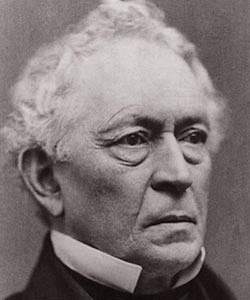Edward Everett (American National Biography)
Scholarship
In 1853 the Massachusetts legislature elected Everett to the U.S. Senate. He spoke against the Kansas-Nebraska Bill but was absent when the vote on it was taken. Though he pleaded illness, his constituents were outraged, and Everett resigned, having served but fifteen months of his six-year term. For the rest of the 1850s, Everett was cast in the politically futile role of a moderate in a time of polarization. A Burkean conservative dedicated to balance and harmony, he felt the Union was being torn apart by ideological extremism. Holding no office, Everett traveled about the country giving speeches designed to foster nationalist sentiments, the most famous of them being "The Character of Washington," which he delivered 135 times. In 1860 Everett was the vice presidential candidate of the Constitutional Union party, the last gasp of the Whigs, though he entertained no illusions about his chance of winning. The Constitutional Union ticket, headed by John Bell of Tennessee, ran fairly well in the South, where it provided an acceptable vehicle for southern Whigs, but most northern Whigs had by this time transferred their allegiance to the new Republican party.
Once Fort Sumter had been fired upon, Everett ceased to be a moderate of any sort; his nationalism now dictated strong support for the war effort. Accordingly, the elder statesman embarked on another round of speech making, rallying northern public opinion.
Once Fort Sumter had been fired upon, Everett ceased to be a moderate of any sort; his nationalism now dictated strong support for the war effort. Accordingly, the elder statesman embarked on another round of speech making, rallying northern public opinion.
Daniel Walker Howe, "Everett, Edward," American National Biography Online, February 2000, http://www.anb.org/articles/04/04-00352.html.
Edward Everett (Congressional Biographical Directory)
Reference
EVERETT, Edward, (father of William Everett), a Representative and a Senator from Massachusetts; born in Dorchester, Mass., April 11, 1794; graduated from Harvard University in 1811; tutor in that university 1812-1814; studied theology and was ordained pastor of the Brattle Street Unitarian Church, Boston, in 1814; professor of Greek literature at Harvard University 1815-1826; overseer of Harvard University 1827-1847, 1849-1854, and 1862-1865; elected to the Nineteenth and to the four succeeding Congresses (March 4, 1825-March 3, 1835); declined to be a candidate for renomination in 1834; chairman, Committee on Foreign Affairs (Twentieth Congress); Governor of Massachusetts 1836-1840; appointed United States Envoy Extraordinary and Minister Plenipotentiary to Great Britain 1841-1845; declined a diplomatic commission to China in 1843; president of Harvard University 1846-1849; appointed Secretary of State by President Millard Fillmore to fill the vacancy caused by the death of Daniel Webster and served from November 6, 1852, to March 3, 1853; elected as a Whig to the United States Senate and served from March 4, 1853, until his resignation, effective June 1, 1854; unsuccessful candidate for vice president of the United States in 1860 on the Constitutional-Union ticket; died in Boston, Mass., January 15, 1865; interment in Mount Auburn Cemetery, Cambridge, Mass.
“Everett, Edward,” Biographical Directory of the United States Congress, 1774 to Present, http://bioguide.congress.gov/scripts/biodisplay.pl?index=E000264.





